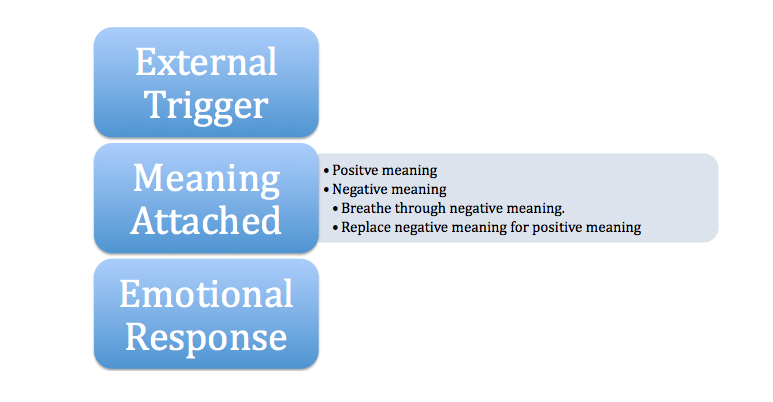Meaning & Mood
Welcome to Format Free Fridays at AskDrDarcy.com, the one day a week when I break the format of answering your questions and I dispense that which we rarely welcome in life: Unsolicited advice.
Today I’m going to talk about the correlation between meaning and mood. Most people presume that our mood is a result of some external or outside event that we have no control over. The truth is, outside events merely trigger our feelings. Stick with me here:
Let’s say I bought my wife the sweater of her dreams for the holidays and as I’m walking off the subway train someone bumps into me and I drop the sweater in the nasty brown subway water & it’s ruined. It’s reasonable to conclude that the external event, i.e., the bump, would cause me to be in a shitty mood, right? Wrong. That’s where most people go astray. My mood is not caused by the external event, i.e., the bump/damaged sweater. Something happens in between the external event and my mood: I assign meaning to the external event.
It is the meaning that I attach to the external event that causes my mood. In this example, the sweater that I bought my wife is actually one that she requested I buy for her, but one that I found to be, uh, not so cute. When it dropped, I thought to myself, “Great. Now I can get her a sexy sweater instead of that grandpa one.”
External events trigger us. It is the meaning that we attach to those events that determines how we will feel. I’ll go so far as to say this: The meaning that we attach to things determines how we feel in EVERY MOMENT of our lives.
Meaning is comprised of two categories: What we want (positive meaning) and what we don’t want (negative meaning). When we attach positive meaning to an event, we feel good. We tend to get energized and motivated which means we’re more likely to take action, creating a positive cycle of energy flow, a concept which Mihály Csíkszentmihályi has written extensively on.
Conversely, when we attach negative meaning to an event, we feel badly. In fact, I can tell you with 100% certainty that whenever you’re feeling badly, it’s because you’re thinking of one of three things:
- What you don’t want.
- A worry, concern or fear.
- Something you want to avoid.
And it’s that simple, as most universal laws are. And I bet more than a few of you are thinking, Does she want me to be a Pollyanna? To which I’d say, Do you read my blog? I’m fairly pragmatic. Sometimes shit just sucks. I get in bad moods. I’m just like you. But my moods don’t rule my life. I am not a slave to my mind (though admittedly, I’m no mastermind either. Yet.). The difference between me and most people is that when I get triggered by life, I sit in the bad mood for just a few minutes and then I make a conscious decision: Can I change something here? Can I change the way I’m looking at this? The meaning I’m attaching to it? If I can, if it makes sense to change the meaning, I do. If it doesn’t, I breathe through it, knowing it will pass as all moods do. I don’t fight it. If I let it come in without fighting it, I find it goes away faster. And soon I’m at an emotional balance (well, about as balanced as my emotions ever get).
 The point is this: Your response to life experiences does not just happen to you. You create it based on the meaning you attach to people, places, things and situations. As long as you take the second step, (the step right after you feel triggered), you’ll have more choices over how you feel moment to moment. And when you have more choice over how you feel, you have some control over your experience.
The point is this: Your response to life experiences does not just happen to you. You create it based on the meaning you attach to people, places, things and situations. As long as you take the second step, (the step right after you feel triggered), you’ll have more choices over how you feel moment to moment. And when you have more choice over how you feel, you have some control over your experience.
The quality of your life is not defined by what happens to you or by the circumstances you’re in. It is defined by the meaning that you attach to life events. Let me know if you’d like to hear more about this by emailing me Darcy@AskDrDarcy.com